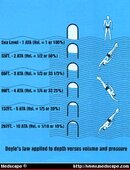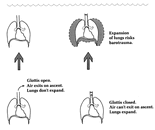Purchase good equipment, and keep it maintained, and you won't have to worry about complete equipment failure.
Everything fails.
A diver in Cozumel ended up completely out of air when crap from a rental tank clogged the tank valve when he when head-down to look at something.
Also, people sometimes get stupid. As much as I'd like stupidity to be painful, it shouldn't be fatal. A safe diver always needs to know where his next breath will come from if the current regulator stops working.
---------- Post added April 23rd, 2013 at 05:41 PM ----------
How can I determine my "comfort level" ? I mean, what should I watch for as I am going deeper ? Are there signs (headache, vision problems, etc) that I am approaching depth that is a limit for my health status ?
"Comfortable" is a false indicator of safety in SCUBA. With a first class regulator and warm water, you could easily be "comfortable" in 200' of water. You wouldn't be safe, and might have no way to safely reach the surface, but you would be comfortable. At least for a while.
"Confident" and "well trained" is more like what you're looking for.
You want to know that you have the training and skills and equipment to safely do whatever dive you're doing. This includes safely ending it in case (when) your equipment fails.
Your Open Water class should teach you what you need to know, although in an effort to be "not scary" most learning materials (books/online/whatever) gloss over things that are both dangerous and not obvious.
For example, you'll learn about diving within the "no decompression" limits. This is a combination of time and depth, either on a printed table or a diver computer, where you are able to safely surface at any time. What they only touch on, is that exceeding the "no decompression" limits requires staying at specific depths for specific times, before surfacing. This is also only generally touched on, not really explained.
What they don't mention is that often, you won't have enough air with you to actually do the required stops, which leaves you with a choice between bent, drowned or trying to convince others to share air with you.
If you take a good class, really learn the materials, regularly practice your skills and dive so that you're always in control, Open Water SCUBA is very safe. If you don't do this stuff, it's just a spin at the Wheel of Consequences.
fltos





